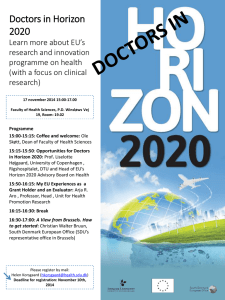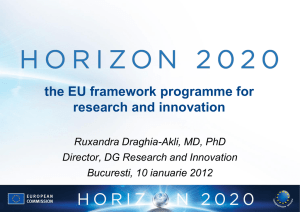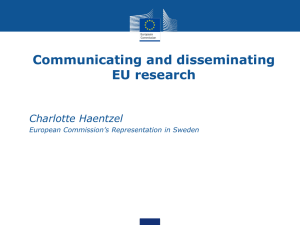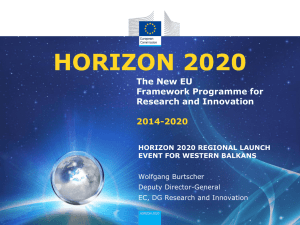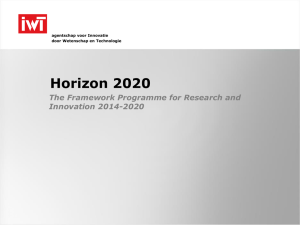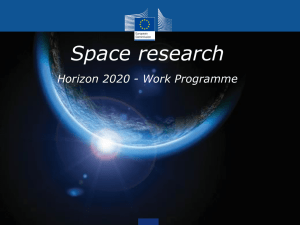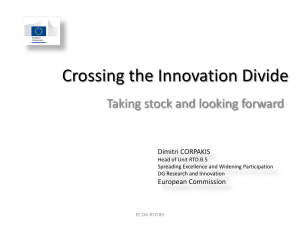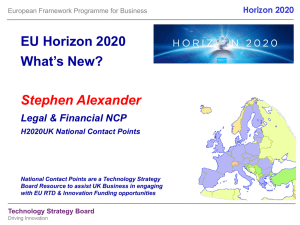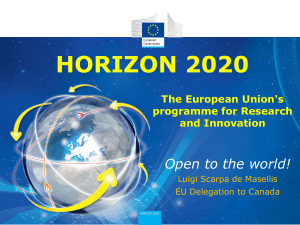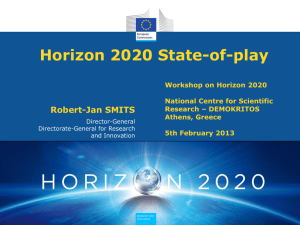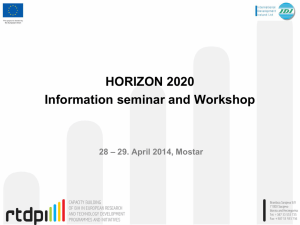Horizon 2020
advertisement
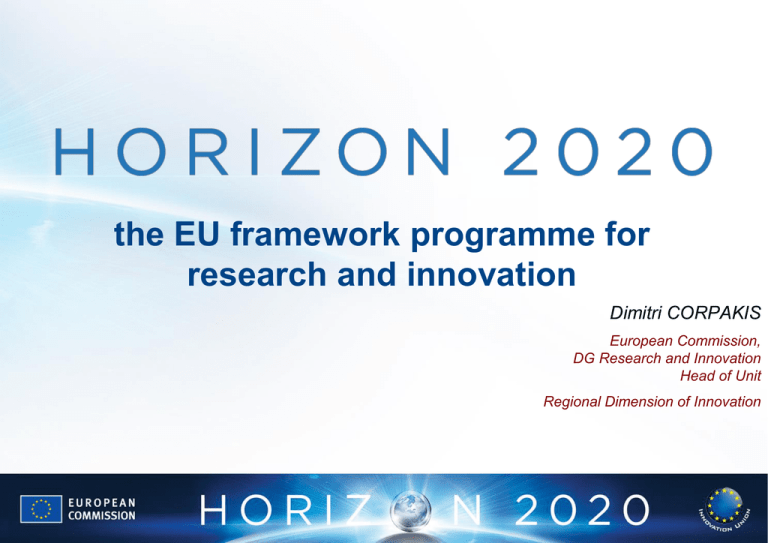
the EU framework programme for research and innovation Dimitri CORPAKIS European Commission, DG Research and Innovation Head of Unit Regional Dimension of Innovation The Multiannual Financial Framework 2014-2020: Commission’s proposals of 29 June 2011 1. Smart & inclusive growth (€491bn) Education, Connecting Cohesion Youth, Sport Europe Competitive Business SMEs Horizon 2020 2. Sustainable growth, natural resources (€383bn) 3. Security and citizenship (€18.5bn) 4. Global Europe (€70bn) 5. Administration (€62.6bn) Total: € 1,025bn Impact of R&D on economic recovery 4.0 SE FI Average R&D investment, 2004-2009 3.5 3.0 DK DE AT 2.5 FR 2.0 BE UK NL LU 1.5 CZ IE ES PT IT EE 1.0 0.0 -5.0 PL HU EL 0.5 LV -4.0 -3.0 -2.0 -1.0 RO BG 0.0 LT SK CY 1.0 GDP growth, 2010 2.0 3.0 4.0 5.0 6.0 What is Horizon 2020 • • • Commission proposal for a 80 billion euro research and innovation funding programme (2014-20) Part of proposals for next EU budget, complementing Structural Funds, education, etc. A core part of Europe 2020, Innovation Union & European Research Area: – Responding to the economic crisis to invest in future jobs and growth – Addressing peoples’ concerns about their livelihoods, safety and environment. – Strengthening the EU’s global position in research, innovation and technology What’s new • A single programme bringing together three separate programmes/initiatives: • The 7th research Framework Programme (FP7), innovation aspects of Competitiveness and Innovation Framework Programme (CIP), EU contribution to the European Institute of Innovation and Technology (EIT) • More innovation, from research to retail, all forms of innovation • Focus on societal challenges facing EU society, e.g. health, clean energy and transport • Simplified access, for all companies, universities, institutes in all EU countries and beyond. Three priorities of Horizon2020: 1 Excellent science 2 Industrial leadership 3 Societal challenges Horizon 2020: indicative budget breakdown EIT 1538€(+1628€) Societal challenges 35892€ JRC/ Non-nuclear 2212€ Excellent science 27818€ Industrial leadership 20280€ TOTAL 87 740 M€ (in current prices, based on the 80 Bn € proposal) Priority 1 Excellent science Why: • World class science is the foundation of tomorrow’s technologies, jobs and wellbeing • Europe needs to develop, attract and retain research talent • Researchers need access to the best infrastructures FET in H2020: 3 complementary, inter-linked approaches Priority 2 Industrial leadership Why: • Europe needs more innovative SMEs to create growth and jobs • Strategic investments in key technologies (e.g. advanced manufacturing, microelectronics) underpin innovation across existing and emerging sectors • Europe needs to attract more private investment in research and innovation Priority 3 Societal challenges Why: • EU policy objectives (climate, environment, energy, transport etc) cannot be achieved without innovation • Breakthrough solutions come from multidisciplinary collaborations, including social sciences & humanities • Promising solutions need to be tested, demonstrated and scaled up *Additional €1 050m for nuclear safety and security from the Euratom Treaty activities (2014-18). Does not include ITER. Horizon 2020 and partnering Public-Private Partnerships (PPPs): • Through Joint Technology Initiatives or other formal structures (§ 187.) • Via contractual arrangements, which provide inputs for workprogrammes • Only when criteria met, e.g. clear commitments from private partners Public-Public Partnerships (P2Ps): • Through “ERA-Nets” for topping up individual calls/ actions (replacing current ERA-Net, ERA-Net Plus, Inco-Net, Inno-net) • Through participation in joint programs between Member States (§ 185.) • Supporting agendas of Joint Programming Initiatives when in line with Horizon 2020 • Only when criteria met, e.g. financial commitments of participating countries European Innovation Partnerships • Not funding instruments, but for coordination with broader policies and programmes Role of the EIT and JRC in Horizon 2020 Three priorities to be supported by: European Institute of Innovation and Technology (EIT) 1 538 + Combining research, innovation & training in Knowledge 1 628* and Innovation Communities Joint Research Centre (JRC)** 2 212** Providing a robust, evidence base for EU policies * Second tranche pro rata from LEIT and Societal challenges (subject to review) **Additional €724 m for the JRC to be funded from the Euratom Treaty activities COM proposal on the future of EIT (30 November 2011) Two waves of new KICs are foreseen in 2014 and 2018. The selection of 1st wave (3 themes, 2014) has been based on – maturity of the field, – the potential societal and economic impact, – opportunities for synergies with other initiatives. Innovation for Healthy living and active ageing; Raw materials – sustainable exploration, extraction, processing, recycling and substitution; Food4future - sustainable supply chain from resources to consumers. 2nd wave in 2018 (3 themes envisaged): Urban mobility Added-value manufacturing Smart secure societies while taking into account new and unforeseen challenges which may arise in the future. Commission's proposal SIMPLIFICATION EU Financial Regulation …ETC SINGLE SET OF RULES for Horizon 2020 Rules for Participation: what’s new? (1) 1. A SINGLE SET OF RULES Adapted for the whole research and innovation cycle Covering all research programmes and funding bodies Aligned to the Financial Regulation, coherent with other new EU Programmes. 2. ONE PROJECT - ONE FUNDING RATE. Maximum of 100% of direct costs (except for actions close to market, where a 70% maximum will apply) Indirect eligible costs: a flat rate of 20% of direct eligible costs 3. SIMPLE EVALUATION CRITERIA • Excellence – Impact - Implementation (Excellence only, for the ERC) 4. NEW FORMS OF FUNDING aimed at innovation: pre-commercial procurement, inducement prizes, dedicated loan and equity instruments. 5. INTERNATIONAL PARTICIPATION: facilitated but better protecting EU interests. Rules for Participation: what’s new? (2) 6. SIMPLER RULES FOR GRANTS: broader acceptance of participants accounting practices for direct costs, flat rate for indirect costs, no time-sheets for personnel working full time on a project, possibility of output-based grants. 7. FEWER, BETTER TARGETED CONTROLS AND AUDITS Lowest possible level of requirements for submission of audit certificates without undermining sound financial management; Audit strategy focused on risk and fraud prevention. 8. IMPROVED RULES ON INTELLECTUAL PROPERTY Balance between legal security and flexibility; Tailor-made IPR provisions for new forms of funding; A new emphasis on open access to research publications. Beyond the Rules: further simplified provisions in the Grant Agreement and implementing procedures to facilitate access to Horizon 2020 (eg. common IT platform). Broader access • For SMEs - dedicated SME projects to address societal challenges and enabling technologies • For all regions – tailored support to policy learning, twinning, networking, complementing Structural Funds • For international partners – broad access to Horizon 2020 (“mainstreaming”), strategic initiatives where there is mutual benefit • For all forms of innovation - social innovation, services, pilots, stimulating demand through public procurement, standard setting Widening participation by unlocking R&I potential of cohesion countries • Principle of excellence: continue to allocate funding on the basis of competitive calls, selecting only the best projects. • Clear division of labour between cohesion policy and Horizon 2020. • – Cohesion policy: support for regions in building up their research and innovation capacity. – Horizon 2020: widen participation, better coordination between the two Union funding programmes, support policy learning reforms. Accompanying measures in Horizon 2020 to ensure that excellence prevails wherever it exists, including: twinning, ERA chairs, support for access to international networks, development of smart specialisation strategies. Specific proposals on broadening access to research and innovation excellence in Horizon 2020 Societal Challenge on Inclusive, innovative and secure societies / Part 6.1.4. Closing the research and innovation divide in Europe (I) Significant regional disparities across Europe in research and innovation performance need to be addressed. Measures will aim at unlocking excellence and innovation and will be distinct, complementary and synergistic with policies and actions of the Cohesion policy Funds. They include: • Linking emerging institutions, centres of excellence and innovative regions in less developed Member States to international leading counterparts elsewhere in Europe: – measures include teaming of excellent research institutions and less developed regions, staff exchanges, expert advice and assistance and the development of joint strategies for the establishment of centres of excellence that may be supported by the Cohesion policy funds in less developed regions. – Building links with innovative clusters and recognising excellence in less developed regions, including through peer reviews and awarding labels of excellence to those institutions that meet international standards, will be considered. Societal Challenge on Inclusive, innovative and secure societies / Part 6.1.4. Closing the research and innovation divide in Europe (II) • Establishing 'ERA Chairs' to attract outstanding academics to institutions with a clear potential for research excellence, in order to help these institutions fully unlock this potential and hereby create a level playing field for research and innovation in the European Research Area. – This will include institutional support for creating a competitive research environment and the framework conditions necessary for attracting, retaining and developing top research talent within these institutions. Societal Challenge on Inclusive, innovative and secure societies / Part 6.1.4. Closing the research and innovation divide in Europe (III) • Supporting access to international networks for excellent researchers and innovators who lack sufficient involvement in European and international networks. This will include support provided through COST and National Contact Points. • Supporting the development and monitoring of smart specialisation strategies. A policy support facility will be developed and policy learning at regional level will be facilitated through international evaluation by peers and best practice sharing. Thanks for your attention! Find out more: http://ec.europa.eu/research/horizon2020
